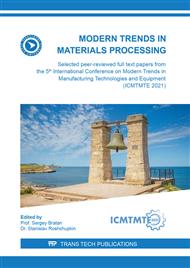[1]
M. B. Nasab and M. R. Hassan, Metallic Biomaterials of Knee and Hip-A Review, Trends in Biomaterials and Artificial Organs, vol. 24, pp.69-82, (2010).
Google Scholar
[2]
M. Navarro, A. Michiardi, O. Castano, and J. Planell, Biomaterials in orthopaedics, Journal of the Royal Society Interface, vol. 5, pp.1137-1158, (2008).
DOI: 10.1098/rsif.2008.0151
Google Scholar
[3]
R. Narayan, Biomedical materials: Springer, (2009).
Google Scholar
[4]
J. R. Davis, Handbook of materials for medical devices: ASM international, (2003).
Google Scholar
[5]
J. B. Brunski, Chapter i.2.3 - Metals: Basic Principles, in Biomaterials Science (Third Edition), D. R. Buddy, et al., Eds., ed: Academic Press, 2013, pp.111-119.
Google Scholar
[6]
E. Ingham and J. Fisher, Biological reactions to wear debris in total joint replacement,, Proceedings of the Institution of Mechanical Engineers, Part H: Journal of Engineering in Medicine, vol. 214, pp.21-37, (2000).
DOI: 10.1243/0954411001535219
Google Scholar
[7]
M. Geetha, A. Singh, R. Asokamani, and A. Gogia, Ti based biomaterials, the ultimate choice for orthopaedic implants–A review,, Progress in Materials Science, vol. 54, pp.397-425, (2009).
DOI: 10.1016/j.pmatsci.2008.06.004
Google Scholar
[8]
W. C. Head, D. J. Bauk, and R. H. Emerson Jr, Titanium as the material of choice for cementless femoral components in total hip arthroplasty,, Clinical Orthopaedics and Related Research, vol. 311, pp.85-90, (1995).
Google Scholar
[9]
M. Long and H. Rack, Titanium alloys in total joint replacement—a materials science perspective,, Biomaterials, vol. 19, pp.1621-1639, (1998).
DOI: 10.1016/s0142-9612(97)00146-4
Google Scholar
[10]
S. Teoh, Fatigue of biomaterials: a review,, International Journal of Fatigue, vol. 22, pp.825-837, (2000).
Google Scholar
[11]
T. M. Wright, S. B. Goodman, and H. C. Amstutz, Implant wear: the future of total joint replacement: symposium, Oakbrook, Illinois, September 1995: Amer Academy of Orthopaedic, (1996).
Google Scholar
[12]
C. Monograph, Centre d'information du Cobalt,, Brussels, Belgium, vol. 185, (1960).
Google Scholar
[13]
W. Belteridge, COBALT AND ITS ALLOYS",, by W. Belteridge, John Wiley & Sons, 159 pages, 1982, (1982).
Google Scholar
[14]
J. J. Jacobs, A. K. Skipor, P. F. Doorn, P. Campbell, T. P. Schmalzried, J. Black, and H. C. Amstutz, Cobalt and Chromium Concentrations in Patients With Metal on Metal Total Hip Replacements,, Clinical Orthopaedics and Related Research, vol. 329, pp. S256-S263, (1996).
DOI: 10.1097/00003086-199608001-00022
Google Scholar
[15]
A. Marti, Cobalt-base alloys used in bone surgery,, Injury, vol. 31, Supplement 4, pp. D18-D21, (2000).
DOI: 10.1016/s0020-1383(00)80018-2
Google Scholar
[16]
W. Brodner, P. Bitzan, V. Meisinger, A. Kaider, F. Gottsauner-Wolf, and R. Kotz, Serum Cobalt Levels After Metal-on-Metal Total Hip Arthroplasty,, The Journal of Bone & Joint Surgery, vol. 85, pp.2168-2173, (2003).
DOI: 10.2106/00004623-200311000-00017
Google Scholar
[17]
F. W. Sunderman Jr, Carcinogenicity of metal alloys in orthopedic prostheses: Clinical and experimental studies,, Fundamental and Applied Toxicology, vol. 13, pp.205-216, (1989).
DOI: 10.1016/0272-0590(89)90257-1
Google Scholar
[18]
T. Visuri, E. Pukkala, P. Paavolainen, P. Pulkkinen, and E. B. Riska, Cancer Risk After Metal on Metal and Polyethylene on Metal Total Hip Arthroplasty,, Clinical Orthopaedics and Related Research, vol. 329, pp. S280-S289, (1996).
DOI: 10.1097/00003086-199608001-00025
Google Scholar
[19]
Spektor V.S., Sarychev S.M., Orlov A.A. The Effect of Surface Conditions on Corrosion Resistance of a CobaltChromium Alloy. Key Engineering Materials Vol. 887, pp.358-363, (2021).
DOI: 10.4028/www.scientific.net/kem.887.358
Google Scholar
[20]
Gavryushenko N.S. Research methodology for the quality of friction units of human hip joint endoprostheses. U1 congress of traumatologists and orthopedists, September 9-12, 1997, Nizhny Novgorod, abstracts, p.537.
Google Scholar
[21]
Unsworth a. at.al. Soft layer lubrications of artificial Hip joints. Inst. Mech. Eng., 1987, p.219.
Google Scholar
[22]
B.R. Rawal, Amit Yadav, Vinod Pare. Life estimation of knee joint prosthesis by combined effect of fatigue and wear. Procedia Technology, 2016, Vol. 23, p.60 – 67.
DOI: 10.1016/j.protcy.2016.03.072
Google Scholar
[23]
Celio Gabriel Figueiredo-Pina, Armanda Agostinho Matos Neves, Bruno Miguel Bandarra das Neves. Corrosion-wear evaluation of a UHMWPE/Co–Cr couple in sliding contact under relatively low contact stress in physiological saline solution. Wear, 2011, Vol. 271 p.665– 670.
DOI: 10.1016/j.wear.2010.11.014
Google Scholar
[24]
M.M. Stack, J. Rodling, M.T. Mathew, H. Jawan,W. Huang, G. Park, C. Hodge. Micro-abrasion–corrosion of a Co–Cr/UHMWPE couple in Ringer's solution: An approach to construction of mechanism and synergism maps for application to bio-implants . Wear, 2010, Vol. 269 p.376–382.
DOI: 10.1016/j.wear.2010.04.022
Google Scholar


